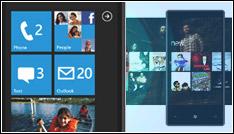Windows Phone Mango Update Adds Bing features

Windows Phone’s “Mango” update will offer Bing Audio, augmented reality, text dictation and audio navigation
Windows Phone’s upcoming “Mango” update will add some previously unannounced features, according to an online report.
The Windows Phone Dev Podcast interviewed Brandon Watson, director of developer experience for Windows Phone, as part of a podcast posted 8 May. In the course of the show, it was revealed that the Mango update (also known as Windows Phone version 7.5) will include Bing Audio, which allows a smartphone to identify any songs playing in the vicinity, and Bing Vision, an augmented-reality feature that will let a smartphone scan barcodes, QR Codes and the like.
Windows Phone 7.5 will also include a turn-by-turn navigation feature, complete with voice guidance, and the ability to dictate SMS texts.
 Mango will arrive on the Windows Phone platform sometime in the latter half of 2011, although an exact release date remains unclear. As previously announced, it will deliver Windows Phone’s version of multitasking, allowing smartphones to download new applications and content in the background, and stream music via one application while working in another. It will also feature the faster Internet Explorer 9.
Mango will arrive on the Windows Phone platform sometime in the latter half of 2011, although an exact release date remains unclear. As previously announced, it will deliver Windows Phone’s version of multitasking, allowing smartphones to download new applications and content in the background, and stream music via one application while working in another. It will also feature the faster Internet Explorer 9.
Even as Microsoft works on producing Mango, it is also prepping developers for the release of updated Windows Phone Developer Tools, which will (at least in theory) allow for the creation of more integrated and high-performance applications. Platform features include application multitasking for background processing, audio and file transfer, and fast application processing, in addition to the ability to leverage augmented reality experiences.
A long road ahead
Microsoft could have a long road ahead as it pushes for greater Windows Phone adoption among consumers. New data from The Nielsen Company suggests that 6 percent of consumers indicated they wanted a Windows Mobile/Windows Phone 7 smartphone as their next device, compared with 31 percent for Android, 30 percent for Apple’s iOS and 11 percent for Research In Motion’s BlackBerry.
That’s paired with numbers from other research firms suggesting Windows Phone, at least in its first half-year of release, retains a small share of the overall smartphone market: in a May 6 note, for example, comScore suggested that Microsoft held 7.5 percent of the US smartphone market in March 2011, a dip from 8.4 percent in December 2010. That placed the company fourth behind Google, RIM and Apple.
Microsoft is also trying to desperately leave behind the increasingly antiquated (and fragmented) Windows Mobile, which may be exerting a drag on the company’s overall smartphone market numbers. Microsoft has stayed largely silent on smartphone shipment numbers, save for a January announcement that some 2 million Windows Phone units had shipped from manufacturers to retailers.
Microsoft’s alliance with Nokia, which will see Windows Phone ported onto the latter’s hardware, also has the potential to radically alter the smartphone landscape. However, those devices most likely won’t make an appearance before 2012.